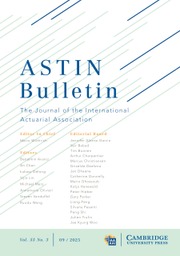Article contents
Homogeneous Premium Calculation Principles
Published online by Cambridge University Press: 29 August 2014
Abstract
A premium calculation principle π is called positively homogeneous if π(cX) = cπ(X) for all c > 0 and all random variables X. For all known principles it is shown that this condition is fulfilled if it is satisfied for two specific values of c only, say c = 2 and c = 3, and for only all two point random variables X. In the case of the Esscher principle one value of c suffices. In short this means that local homogeneity implies global homogeneity. From this it follows that in the case of the zero utility principle or Swiss premium calculation principle, the underlying utility function is of a very specific type.
A very general theorem on premium calculation principles which satisfy a weak continuity condition, is added. Among others the proof uses Kroneckers Theorem on Diophantine Approximations.
- Type
- Research Article
- Information
- Copyright
- Copyright © International Actuarial Association 1984
References
REFERENCES
- 8
- Cited by


